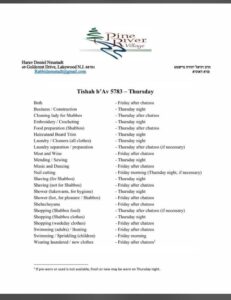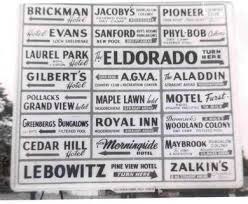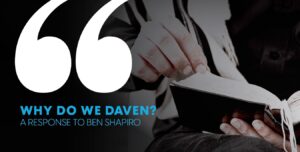Raboyseyee and Ladies,
Remembering and Observing
With thirteen full years of parsha reviews in the rear-view mirror, we begin year fourteen today with Parshas Vo’eschanan. A very Happy Anniversary to the heylige Ois who began writing one Friday afternoon to but one chaver who asked for a quickie (devar Torah, you chazir). Then, like it is today and every year on this parsha, it was erev Shabbis Nachamu. Today the readership exceeds hundreds of thousands in all corners of the earth.
Yesterday, as the Ois was getting into the right mindset for Tisha B’ov observance and just after he took his last cold shower of the nine days and discovered that he was down to his last pair of clean(ish) gotchkis (underwear), the heylige internet again saved the day when he opened this very critical PSA seemingly out of Lakewood, New Jersey. One has to wonder why we still observe two days of Yom Tov here -outside of Israel- when our rabbis know with such precision what is permitted.

As mentioned many times over the years, Shabbis Nachamu evokes many fond memories of days and years past where this particular shabbis was typically spent at one or more of the Glatt-kosher hotels -or even bungalow colonies- off Route 17 between Exits 113 and 100, along and off Routes 42, 52, and a few side roads; them were the days my friends. These days you can find orthodox Yiddin and Chasidim in particular, along all exits of Rt 17 as they continue to buy all available land and development sites. It won’t be long before Walmart near Monticello will be closed for Shabbis.

Upon arrival to the hotels, we staked out our lounges near and around the pool because avada we knew from learning the heylige Toirah that being near water was a good omen for meeting a nice girl. Didn’t Moishe Rabaynu meet his eishes chayil Tzipoirah near water? He did! And didn’t Yaakov meet at least on his four wives near water? Indeed he did. In fact, he kissed her at first sight. He liked her so much, he married her, her sister and her two half-sisters. You didn’t know that Lovon, his father-in-law, also fathered Bilha and Zilpah? Now you do! Shoin! And didn’t Avrohom Ovenu send Eliezer his servant, after making him swear by placing his hand under his ‘yerech’, if you chap, to look near the water in order to facilitate Eleizer’s mission of finding a suitable match for his son Yitzchok? He did. Shoin, and in that spirit, after checking in, we made a mad dash over to the pool area where we slipped the pool boys a few dollars in order to chap and reserve the best lounges. And taka for many, this worked; many good matches were made over Shabbis Nachamu: Some lasted but the weekend, if you chap, some even got married. Some are still married today. Oh well!

Tradition tells us that we are to be happy this weekend, or at least happier that we’ve been in the three weeks leading up to Tisa B’Ov, and taka Shabbis Nachamu is so named because of the opening words of this week’s Haftoirah wherein the Novee exhorts us to be comforted. Ober how happy can we be when our hero Moishe, despite his pleadings and supplications as the parsha opens, is told by the RBSO that the ruling is final? Moishe will not be entering the land. Why taka punkt (specifically) on Shabbis Nachamu, freshly showered, shaven, with clean underwear and maybe even after some oineg shabbis on Friday night, if you chap, must we also be reading about Moishe’s distress? And how could it taka be that our hero and leader Moishe, who was able to save many – in fact the entire nation, and on more than one occasion- was unable to strike a decent deal for himself? Did he need former President Trump at his side?

So happens that the entire episode of Moishe’s unrelenting pleadings and the RBSO’s immutable ruling bothered many and the Abrabanel opens his discussion of this parsha with twenty-seven questions; yikes! Avada we cannot tackle them all -or even a few- ober we need to chap that Moishe’s harsh treatment for a seemingly tiny avaryro, bothered many and it should. The bottom line: Seemingly, there are leaders that can help others but cannot, when it counts most, save themselves. The Ois happens to know a few who mamish fit into that category.
As our parsha begins, Moishe is reminding the Yiddin how he pleaded with the RBSO -begging mamish, some say (medrish) as many as 515 times- to be given the opportunity to enter the Promised Land. Ober the RBSO said no! And not just did the RBSO say no, but listen to this: Said the RBSO: not just is the answer still no, but stop asking Me; case closed! Moreover, says the heylige Toirah, that the RBSO teased Moishe and told him to climb the mountain and gaze his eyes in all four directions to see the land that he wasn’t going to see up close. Is that nice? Is this how Moishe was to be rewarded for so many years of selfless dedication? What chances do we have when we meet our Maker one day -hopefully not too soon? Oy vey! Moishe asked azoy: “let me go over and see the land,” ober the RBSO responded that Moishe could see the land, but only from afar. He was not to go over into the Promised Land. And the question is azoy: should Moishe have davened more than 515 times? Was 516 the magic number? Would that have helped? Did he give up too early? Or, was his davening an exercise in futility, ver veyst? Is ours?

On the other hand, the heylige Toirah does tell us that Moishe davened to the RBSO to save Miriam and his prayers were answered. And how many times was he -as mentioned above- successful in saving all the Yiddin from extinction? At least several over the 40 years they spent together valgering in the midbar. Is there a direct connection between how fervently one davens and whether or not one’s wishes are granted? Ver veyst? On the other hand, haven’t many of us davened with great fervor to save a life, or, on behalf of a loved one or sick relative only to see that person expire? Does davening help? Or do we daven because we need to pour our hearts out to someone when we are in pain? Ver veyst?
Says the medrish azoy: when Moishe finally chapped that he was fired and that he would not be leading the people into Promised Land as their leader, he came back with another plan. Moishe begged to be allowed to enter Israel even as a lay person, not a leader. And when the RBSO refused this back up request, Moishe asked for his body to be taken in and buried. Ober the RBSO did not grant this wish either. Shtlet zich di shaylo (the question arises) azoy: avada we all chap that the Yiddin never had or will have a leader like Moishe, yet even his body wasn’t allowed in? Did Moishe forget to reserve or buy a plot over at one of the coveted cemeteries over in Yirusholayim?

Ober raboyseyee, the rabbinic/midrashic sources are themselves at conflict regarding the reason for Moishe’s death outside the borders of the Promised Land of Israel. One medirsh relates Moishe’s punishment to an incident that had transpired years before: let’s explore that one and avada if it’s a medrish, it may contain a few sexual overtones; taka it does. Rev Levi said azoy: Moishe said to the RBSO, ‘Master of the Universe, the bones of Yoisef are entering the Land, and am I not to enter the Land?! The Holy One, blessed be He, answered him: ‘He who acknowledged his native land is to be buried in that land but he who did not acknowledge his native land does not merit to be buried in his land. Whence do we know that Yoisef acknowledged his native land? His mistress (Mrs. Potiphar) exclaimed of him, “See, he has brought in a Hebrew, etc.” (Bereishis 39:14); and he did not deny it, but in addition said, “For indeed I was stolen away out of the land of the Hebrews (Bereishis 40:15); he is to be buried in his native land. Whence do we know this? For it is said (Yehoshua 24:32): “And the bones of Yoisef, which the Children of Israel brought up out of Egypt, they buried in Shechem.” But you who did not acknowledge your native land will not be buried in that land.’ When was this? When the daughters of Yisroy said, ‘An Egyptian delivered us from the hand of the shepherds (Shmois 2:19), and Moishe heard and kept silent; therefore, he is not to be buried in his land. (Medrish Rabbah Devorim 2:8). The bottom line: as mentioned over the years, the RBSO punishes the very good guys over very tiny sins; most of you have nothing to worry about. Buy a plot and you will surely be buried in the land. Buy some extra land and you can enjoy one day of Yom Tov instead of two. Shoin.
Let’s close out with some other givaldige news: In case you missed shul, or, were talking chas v’sholom during the laining of Parshas Yisroy -way back in Sefer Shmois- and missed the gantze thunder and light show when the RBSO Himself came down and gifted the Yiddin the Aseres Hadibris (Ten Commandments), not to worry. They, albeit with a few modifications, make a second appearance in this week’s special parsha of Vo’eschanan.
A few modifications? Were they new and improved? Were certain commandments changed for the times? A second appearance of the same one’s? What’s pshat? So happens that every rebbe the Ois ever had -at the various yeshivas he found himself in- stated over and again -with certitude- that nothing is repeated in the heylige Toirah, not one word? Yet, we have a second reading of the same commandments? Taka an excellent kasha and the general answer proffered by many is that repetition in the heylige Toirah -when found- and there’s plenty of it- is there to teach us new things. In other words: it’s not what you think! Looks like one thing but it’s another. Grada this isn’t a terrible excuse if one gets chapped.
The bottom line is azoy: it’s taka the case that the Decalogue (a fancy word for the Ten Commandments) in our parsha (Devorim 5:6–17) differs in both large and small ways from that of (Shmois 20:1–13). Many exegetes have written on the differences and each proffers an opinion on the repetition and why. So happens that the Ois was home in bed a few days this week with a shtikel COVID and while taking a look at the parsha -searching for new material as he begins year 14- came across a few words from the Ibn Ezra that mamish blew his mind. He provides a detailed list of the differences -large and small- between the two different sets of the same Ten Commandments and then he blasts away at other exegetes who have pontificated on the changes. So that you look like a mentch at the Shabbis tish this special shabbis -whether poolside in the Hamptons, or while lounging and gossiping about the latest scams and arrests at your respective bungalow colonies- let us begin with the Ibn Ezra’s shtikel rant about a one-word change regarding shabbis observance. Drum roll please.
“We have found that from the beginning of the first commandment until the end of the third there are no differences between the versions. However, from the fourth commandment on, there are many differences.” Veyter! The action picks up with the fourth commandment, the one regarding shabbis observance. Says the Ibn Ezra azoy: The first version says “Remember the shabbis,” while the second -here in our parsha-says “Observe the shabbis.” בראשונה זכור, ובשנית שמור
And the kasha (question) is this: we know that for 40 years while the Yiddin were getting into all kinds of trouble, Moishe -over and again- reminded them about shabbis observance. Oib, azoy (that being the case) why make a change here in our parsha from ’remember’ to ‘observe’ or ‘keep?’ Back in yeshiva, in response to the two words commanding shabbis observance, the rebbe told us that both words -remember and observe- were said by the RBSO at the same time. Exactly what that means when the parsha only gave us one of those words, ver veyst? That being stated, many an exegete in the heylige Gemora and in the medrish has taken the position that that’s what took place; case closed. When you meet the RBSO one day, feel free to ask Him just what He said and meant.
Ober says the Ibn Ezra that it’s not emes. Let’s read in Hebrew before we translate into English for most of you bums on whom your parents spent so much money on yeshiva:
וכאשר חפשנו בדברי חז”ל מה אמרו על ככה, מצאנו שאמרו זכור ושמור בדבור אחד נאמרו. וזה הדבור קשה מכל הקושיות שהיו לנו כאשר אפרש. וחלילה חלילה, שאומר שלא דברו נכונה, כי דעתינו נקלה כנגד דעתם. רק אנשי דורינו יחשבו כי דבריהם כמשמעם, ואינו כן, כאשר אפרש בסוף, אחר שאזכיר הקושיות.
When we examined the words of the ancient rabbis to see how they related to this issue, we found that they said: “‘Remember’ and ‘Observe’ were said together.” This line, as I shall explain, is even more difficult than all the problems that I listed above. And heaven forbid, heaven forbid (repeated twice by him for emphasis) that I would say that the rabbis spoke incorrectly! Our minds are nothing compared to theirs! But the people of our generation insist on taking their comments literally, when that is not the case, as I shall explain in the continuation, after I explain the difficulties [involved in taking this statement literally].
What taka went down? Why was the word changed? And if taka both words (re shabbis observance) were pronounced at the same time, why does the text of the heylige Toirah not read “Remember and observe” in both appearances of the Aseres Hadibrois?
למה לא נכתב בראשונה: זכור ושמור, גם כן בשנית
Says the Ibn Ezra azoy: it’s no big deal. In Shmois, the words of the Ten Commandments were directly from the RBSO with no additions or deletions. Only they [and not the words in our parsha are found on the tablets of the covenant [which Moishe brought down from Mount Sinai]. Ober, when Moishe retold their history to the Yiddin, he reworded some of the commandments in the Decalogue to make them easier to understand. Does everyone agree? Of course not! And that raboyseyee is what makes us distinctly Jewish; everyone has an opinion and mostly we can’t stand listening to the opinion of others. And that raboyseyee is the bottom line. Hence we have Tisha B’ov to remember how the Yiddin didn’t get along and the RBSO destroyed the Beis Hamikdash. Will things ever get better? Not! The good news: The case is settled and going forward when you make kiddish on shabbis, feel free to use either of the two words.

Ober, why taka are the commandments repeated? For most of you, the second reading this shabbis is to remind you not to violate the big Loi sa-says (the negative commandments) which avada include a warning against coveting that which is not yours, especially in the bungalow colonies.
A gittin Shabbis-
The Heylige Oisvorfer Ruv
Yitz Grossman
